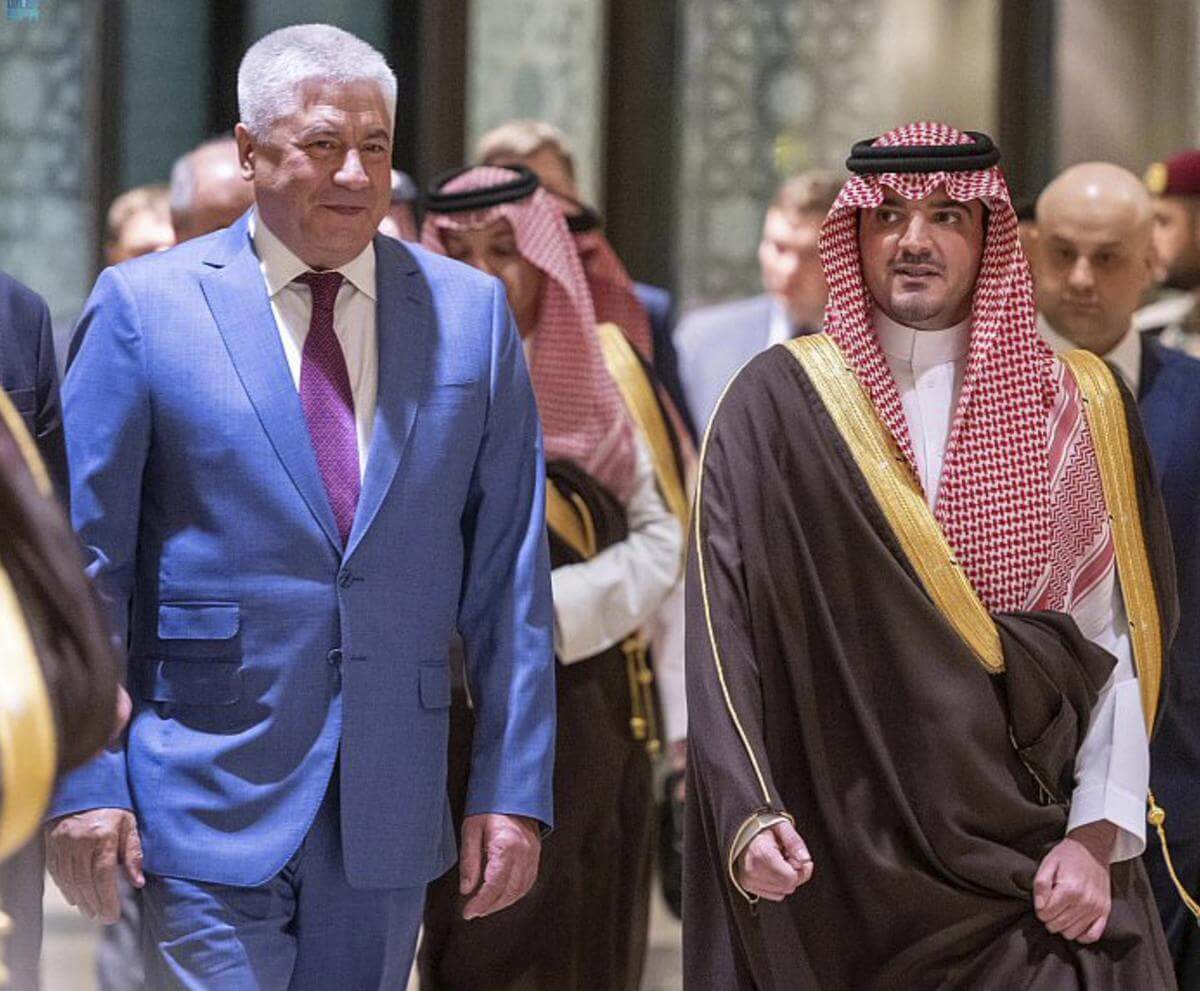Russian Interior Minister Vladimir Kolokoltsev, facing Western sanctions for Moscow’s attack on Ukraine, visited Saudi Arabia on Tuesday and met with his Saudi counterpart Prince Abdulaziz bin Saud, as reported by official state media.
Kolokoltsev’s visit to Riyadh comes only a few days after Ukrainian President Volodymyr Zelensky spoke at an Arab League meeting in Saudi Arabia’s Red Sea port city of Jeddah.
Russia-Saudi Security Talks
The state-run Saudi Press Agency said, “During the session, [the ministers] discussed ways to enhance security cooperation paths between the two countries’ interior ministries, in addition to discussing a number of issues of common interest.” Several other kingdom interior ministry officials and Russian Ambassador Sergey Kozlov attended the meeting as well.
Kolokoltsev received a pleasant welcome to Riyadh despite him being sanctioned by the US, Australia, Canada, EU, Japan, New Zealand, and the UK.
In 2022, Washington refused to allow him a visa to attend a UN gathering of police chiefs. His visit came only four days after Zelensky paid a surprise visit to the country to participate in the 32nd annual Arab League meeting to condemn the assembled leaders for remaining neutral in Russia’s war.
Russia’s sanctioned interior minister visits Saudi Arabia https://t.co/zp2eXb1Rzm
— The Times of Israel (@TimesofIsrael) May 23, 2023
Back-to-back trips by officials from opposing sides highlight how Saudi Arabia and other Gulf Arab governments have realigned their interests away from those of the West and tried to strengthen ties with the Kremlin.
Riyadh has particularly strengthened its oil and commercial relations with Moscow over the past year, infuriating the West. Saudi Crown Prince Mohammed bin Salman (MBS) has also encouraged the kingdom to present itself as a potential mediator between Kyiv and Moscow to end the war.
“The kingdom is ready to continue mediating between Russia and Ukraine and to support all international efforts to end the crisis politically towards peace,” MBS said on Friday at the Arab League summit.
Russia-Saudi Growing Relations
Given Western sanctions on Moscow, Saudi Arabia has been importing Russian diesel fuel at much lower prices since the beginning of the Ukrain War. This diesel has been less expensive for the Kingdom as it exports its crude oil products abroad to capitalise on global prices.
According to Kozlov, there is plenty of opportunity for expansion in Russia-Saudi bilateral trade, and the two nations plan to attain an initial target of $5 billion. He added that positive developments characterise bilateral trade and economic ties between the two countries. Moscow regards Riyadh as a viable trade and financial partner with a rising influence in global and regional affairs.
Since the beginning of OPEC Plus’ oil production arrangement in 2016, the Kremlin’s ties to Saudi Arabia and other Gulf Cooperation Council (GCC) members have grown steadily. Most GCC countries abstained from voting in a UN resolution denouncing Russia for the Ukraine war.
When oil prices hit $130 per barrel in March, Saudi and other Gulf officials rejected requests from US and EU leaders to increase oil production to relieve pressure on the global economy and help contain inflation. Instead, they criticised Western governments for prioritising energy and climate goals over investments in new fossil fuel development.
By bringing #China and #Russia into the region and by developing strategic partnerships with important players such as #India, #Riyadh is signalling its intent to reduce its dependence on the US, writes @navdeepsuri https://t.co/5xfN31MIDf
— ORF (@orfonline) May 20, 2023
With Saudi Arabia exporting amino resins, acyclic alcohols, and polyacetals, the petroleum chemicals industry accounts for a large percentage of the bilateral trade volumes between Saudi Arabia and Russia.
Russia exports refined petroleum, barley, and other foodstuffs in exchange.
In 2022, bilateral trade reached about $1.75 billion.
Saudi Actions Impacting Middle Eastern Geopolitics
Regional rivals Saudi Arabia and Iran announced in March that they are resuming full diplomatic relations as part of a deal mediated by China. Such a move might alleviate regional tensions and highlight China’s expanding influence in the Gulf.
The accord allows Saudi Arabia and Iran to reopen their embassies and diplomatic missions over the next several months. It also reinstates agreements on security cooperation, commerce, and investment, and seeks a durable cease-fire and a way out of Yemen’s years-long conflict with the Iranian-backed Houthi movement. The resumption of relations with Iran might restrict weapons shipments to the Houthis and help end the Yemen war.
Saudi Arabia has signalled its willingness to minimise its reliance on the US by bringing China and Russia into the area and forging strategic ties with vital players such as India. MBS is considering a multi-alignment policy to give him greater strategic autonomy.
China also maintains close ties with Saudi Arabia, its largest oil customer. During a high-profile visit to the kingdom in December, Chinese President Xi Jinping was warmly welcomed, and it also showed Beijing’s desire to increase its influence in the Gulf. This region has historically been closely allied with the US regarding security.
However, Saudi Arabia still heavily relies on the US for its defence and weaponry, despite difficulties in the bilateral relationship due to human rights issues in Saudi Arabia and enduring concerns among Gulf Arab governments about the US commitment to their security.

